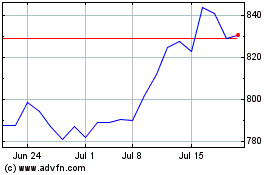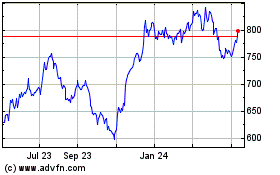BlackRock Offers Vote of Confidence to Mainland China's Stock Markets
April 20 2017 - 5:39AM
Dow Jones News
By Gregor Stuart Hunter
Big fund managers are for the first time dropping opposition to
including domestic Chinese equities in key global indexes, a sign
that the mainland's huge stock markets may finally be coming of
age.
BlackRock Inc., the world's largest asset manager, said Thursday
that it supports including mainland shares in the benchmarks of
MSCI Inc., whose indexes are used by global money managers to guide
trillions of dollars in investments. Deutsche Asset Management, one
of the world's biggest managers of exchange-traded funds, also said
that from the ETF perspective there are no more technical problems
with including China's domestic equities, known as A-shares, in
MSCI indexes.
Other fund managers such as UBS Asset Management, Fidelity
International and Matthews Asia, said they think inclusion is
becoming more likely.
MSCI, which typically tweaks its indexes each year around June,
declined to comment.
Inclusion of A-shares in MSCI indexes could be a watershed for
China's $7.82 trillion in domestic equities, the world's
second-biggest pool after the U.S. China's markets have slowly
opened to foreign investors. In previous years MSCI has said the
markets weren't accessible or transparent enough to warrant
inclusion of mainland stocks in its benchmarks. Only Chinese
companies listed offshore in places such as Hong Kong and New York
are included in MSCI indexes.
The inclusion of A-shares would mean that the many global fund
managers, including pension funds and insurers, that invest based
on MSCI indexes would have to add mainland equities to their
portfolios. Funds that compare their performance to that of an MSCI
index that included Chinese stocks would likely buy those shares as
well.
MSCI's Emerging Markets Index, for instance, is the most widely
tracked benchmark of performance of stocks in the developing world
and is followed by money managers with $1.6 trillion in assets.
Société Générale estimates that inclusion of A-shares in MSCI
indexes could immediately lead global funds to buy about $13
billion in Chinese equities, and that amount would rise as more
Chinese stocks are included.
Chinese authorities have been lobbying for MSCI inclusion for
years, taking steps to fix problems such as unclear ownership laws
and curbs on the amount of money foreigners can invest in mainland
shares. Two years ago, selected shares on the Shanghai Stock
Exchange were opened to foreign investment through a trading link
with the Hong Kong market--an improvement over previous rules that
permitted only a few handpicked fund managers to buy shares under a
quota system. In December, China opened a similar trading link to
the Shenzhen Stock Exchange, the country's other major equities
market.
One of the major hurdles for China in winning the trust of
global investors has been the memory of the 2015 market crash,
during which more than a thousand companies suspended trading of
their shares--some for months.
Chinese exchanges implemented rules last year that limit the
circumstances under which shares can be suspended, while MSCI has
pledged it would remove shares from its index if they have been
frozen for more than 50 days.
To be sure, many investors remain wary of onshore Chinese
markets, where the state invests heavily and regulations are often
opaque. Performance of Chinese companies listed in Hong Kong has
been much better than those in the mainland this year, and not much
money is flowing through the trading links to Shanghai and
Shenzhen.
MSCI has also scaled back its China ambitions, trimming the
number of mainland shares it proposes to add to 169, a third of
what it had suggested in 2016. It also said that Chinese officials
have addressed many of its past concerns. The company will make a
decision on A-share inclusion this summer after consulting with its
clients.
The biggest of those is BlackRock, which manages $5.4 trillion
in assets and says it is in favor. Another, Deutsche Asset
Management, which manages $746 billion in assets, said the fund no
longer sees technical obstacles to including Chinese stocks.
Some hurdles to foreign investment remain, such as different
holiday schedules, the lack of a method of determining closing
prices in Shanghai and a daily quota for orders through the trading
links with Hong Kong, investors say. MSCI is also negotiating with
the Shanghai and Shenzhen exchanges over a requirement that they
approve any financial products based on their stocks.
The limited number of shares that MSCI is proposing to add this
year means the inclusion could be mostly symbolic, said Catherine
Yeung, investment director at Fidelity International.
But the more modest proposal is also more likely to succeed,
said Geoffrey Wong, head of global emerging-markets equities at UBS
Asset Management in Singapore. He said the fund manager isn't
lobbying for inclusion but that its clients are looking at the
change more favorably.
Andy Rothman, investment strategist at San Francisco-based fund
manager Matthews Asia, said the firm is buying more A-shares in
anticipation of a inclusion. "From an investor's perspective, you
just have to assume that China is going to be included in the
not-too-distant future," he said.
Write to Gregor Stuart Hunter at gregor.hunter@wsj.com
(END) Dow Jones Newswires
April 20, 2017 05:24 ET (09:24 GMT)
Copyright (c) 2017 Dow Jones & Company, Inc.
BlackRock (NYSE:BLK)
Historical Stock Chart
From Mar 2024 to Apr 2024

BlackRock (NYSE:BLK)
Historical Stock Chart
From Apr 2023 to Apr 2024
